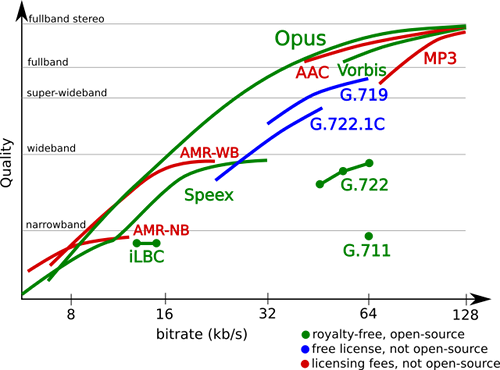In a great victory for open standards, the Internet Engineering Task Force (IETF) has just standardized Opus as RFC 6716.
Opus is the first state of the art, free audio codec to be standardized. We think this will help us achieve wider adoption than prior royalty-free codecs like Speex and Vorbis. This spells the beginning of the end for proprietary formats, and we are now working on doing the same thing for video.
There was both skepticism and outright opposition to this work when it was first proposed in the IETF over 3 years ago. However, the results have shown that we can create a better codec through collaboration, rather than competition between patented technologies. Open standards benefit both open source organizations and proprietary companies, and we have been successful working together to create one. Opus is the result of a collaboration between many organizations, including the IETF, Mozilla, Microsoft (through Skype), Xiph.Org, Octasic, Broadcom, and Google.
A highly flexible codec
Unlike previous audio codecs, which have typically focused on a narrow set of applications (either voice or music, in a narrow range of bitrates, for either real-time or storage applications), Opus is highly flexible. It can adaptively switch among:
- Bitrates from 6 kb/s to 512 kb/s
- Voice and music
- Mono and stereo
- Narrowband (8 kHz) to Fullband (48 kHz)
- Frame sizes from 2.5 ms to 60 ms
Most importantly, it can adapt seamlessly within these operating points. Doing all of this with proprietary codecs would require at least six different codecs. Opus replaces all of them, with better quality.

The specification is available in RFC 6716, which includes the reference implementation. Up-to-date software releases are also available.
Some audio standards define a normative encoder, which cannot be improved after it is standardized. Others allow for flexibility in the encoder, but release an intentionally hobbled reference implementation to force you to license their proprietary encoders. For Opus, we chose to allow flexibility for future encoders, but we also made the best one we knew how and released that as the reference implementation, so everyone could use it. We will continue to improve it, and keep releasing those improvements as open source.
Use cases
Opus is primarily designed for use in interactive applications on the Internet, including voice over IP (VoIP), teleconferencing, in-game chatting, and even live, distributed music performances. The IETF recently decided with “strong consensus” to adopt Opus as a mandatory-to-implement (MTI) codec for WebRTC, an upcoming standard for real-time communication on the web. Despite the focus on low latency, Opus also excels at streaming and storage applications, beating existing high-delay codecs like Vorbis and HE-AAC. It’s great for internet radio, adaptive streaming, game sound effects, and much more.
Although Opus is just out, it is already supported in many applications, such as Firefox, GStreamer, FFMpeg, foobar2000, K-Lite Codec Pack, and lavfilters, with upcoming support in VLC, rockbox and Mumble.
For more information, visit the Opus website.
About Jean-Marc Valin
Jean-Marc Valin has a B.S., M.S., and PhD in Electrical Engineering from the University of Sherbrooke. He is the primary author of the Speex codec and one of the main authors of the Opus codec. His expertise includes speech and audio coding, speech recognition, echo cancellation, and other audio-related topics. He is currently employed by Mozilla to work on next-generation multimedia codecs.
More articles by Jean-Marc Valin…
About Timothy B. Terriberry
Timothy B. Terriberry is a long-time volunteer for the Xiph.Org foundation, working on codecs such as Theora, Vorbis, CELT, and Opus. He has been contributing to Mozilla's media support since 2008 and hacking on WebRTC since 2010.


89 comments